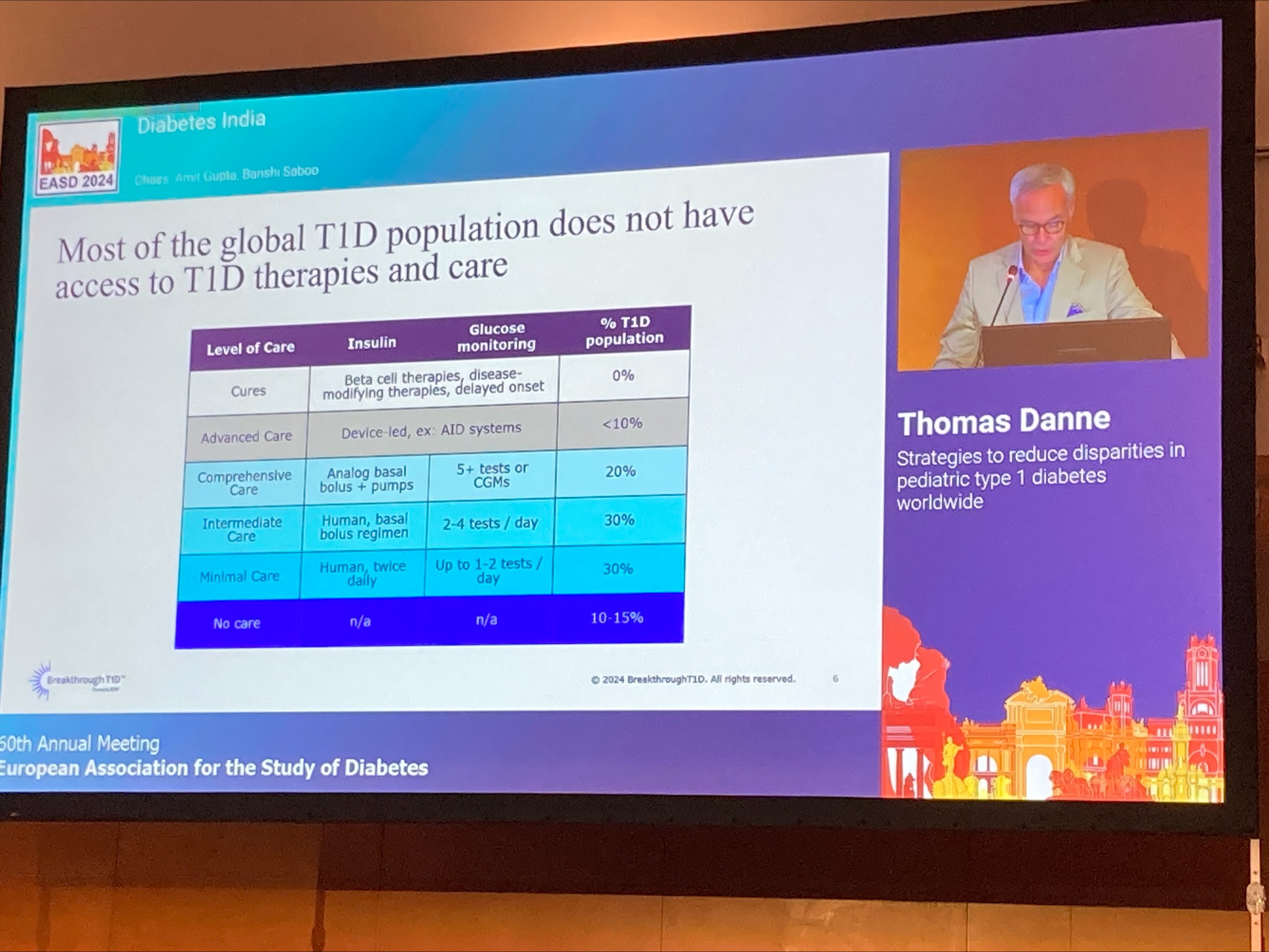Diabetes stigma, new technologies and access: learnings from EASD 2024 as a #dedoc° voice
Last week, I was one of 25 #dedoc° voices attending the world’s largest diabetes congress in person (with a further 25 #dedoc° voices attending online), organised by the European Association for the Study of Diabetes (EASD). Taking place in Madrid and with over 10,000 participants, 25 diabetes activists from different countries were in attendance as #dedoc° voices after receiving a scholarship. Besides sharing experiences from each country, we had the opportunity to interact with international activists, educators, practitioners and scientists from around the globe.
The #dedoc° voices who attended EASD 2024 on scholarship came from a diverse range of countries and backgrounds. Source: Mark Barone
Diabetes technology: new arrivals around the world and the benefits of hybrid closed-loop systems
The technological evolution presented at the product exhibition fair was impressive. There were countless stands displaying different glucose sensors. When talking to the exhibitors, we learned that some of the lesser-known brands are already in the process of registration in Brazil and other low- and middle income countries. Members of the diabetes community even tested more than one sensor simultaneously during the conference. Salih Hendricks, a #dedoc° voice and diabetes advocate from South Africa, had one of the more established brands of sensor on one arm, and a sensor that just launched in his country on the other. His report was: “the results are very close.”
Statistics supporting the use of CGM in type 2 diabetes, presented at EASD 2024. Source: Mark Barone
Most of the presentations focusing on diabetes technology showed good results from hybrid closed loop systems using a diverse range of pumps and algorithms, although primarily using sensors from big-name companies. A presentation by Dr. Tadej Battelino showed good results amongst very young children using hybrid closed loop, an age group for which there is still no approval. Presentations by Dr. Battelino and other speakers also presented both clinical and economic evidence for adopting continuous glucose monitoring with sensors for people with type 2 diabetes.
Access to diabetes care: global inequality remains an issue
Regarding access to care, the inequality between countries remains immense. In European countries like Germany, France, Sweden, and others, there is full access to the most modern technologies, including hybrid closed loop systems with pump and sensor, the newest insulins, and other medications. In comparison, in countries like Pakistan, among many others, access is limited, and children routinely die due to the lack of access to self-care basics. Dr. Thomas Danne from Breakthrough T1D presented global data showing that less than 10% of people with type 1 diabetes (T1D) worldwide have access to the latest technologies, 30% have access to the minimum (human insulin and 1 to 2 tests per day), and 10-15% of people with T1D have no access to anything at all.
Dr. Thomas Danne presents statistics on access to diabetes care and technology globally at EASD 2024. Source: Mark Barone
Mental health and diabetes stigma
Lastly, one of the most discussed topics at the congress and by the #dedoc° voices was mental health and stigma in people with diabetes. Among the speakers presenting on this topic were the renowned Prof. Jane Speight and Matthew Garza. Prof. Speight, the world’s leading expert in “Language Matters” research in diabetes, brought a profound reflection on not forgetting what is relevant to the person with living diabetes beyond their health. According to her, the potential of the most current technologies does not matter when issues related to the person’s quality of life are left aside. Matthew Garza presented alarming results showing that 4 out of 5 people with diabetes have experienced stigma, and that 35% of people with T1D in the USA do not like having something attached to their body (pump and/or sensor).
Matthew Garza presents statistics related to diabetes stigma and shame, and the impact it has on the mental health of people living with diabetes. Source: Mark Barone
Still on stigma, some of the #dedoc° voices talked about the impact of diabetes stigma on their mental health. In a very emotional moment at the end of Prof. Speight and Matthew Garza’s session, Mark Tiller, a #dedoc° voice with type 2 diabetes from the UK, shared his own suffering from stigma and prejudice from people with type 1 diabetes, who implied that type 1 diabetes is inevitable and thus blamed people with type 2 for their condition. He also revealed that both healthcare professionals and health authorities prejudge that people with type 2 would not benefit from access to new technologies: however, not only did we see presentations to the contrary at the conference, Mark also revealed a 2.4% drop in his glycated hemoglobin when he started using a glucose sensor.
#dedoc° voices Mark and Nupur hug after sharing their lived experience at EASD 2024. Source: Mark Barone
Honours for 25 years working with diabetes
To conclude, I was honoured by Children with Diabetes and Insulin For Life with a medal for my journey with diabetes and 25 years working with diabetes.
#dedoc° voice Mark Barone received a medal from Children With Diabetes and Insulin for Life, marking more than 25 years living and working with diabetes. Source: Mark Barone





